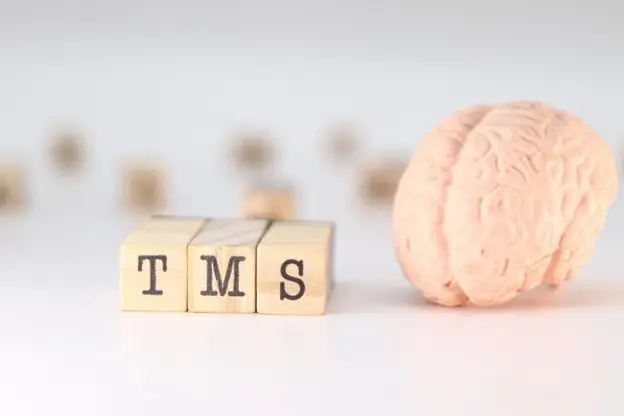Depression is a debilitating mental health disease that affects millions of individuals globally; for those who find little respite through traditional treatments such as medication and psychotherapy, transcranial magnetic stimulation (TMS) therapy can prove a viable alternative treatment. At North Ward Behavioral Health Center, a distinguished practice under the umbrella of Nirvana Healthcare Management Services, we are dedicated to providing innovative treatments for a wide range of mental health conditions to patients across Newark, NJ, and East Orange, NJ.
The mental health professionals on our care team are committed to guiding patients like you toward better mental health and overall quality of life. If you are interested in learning more about TMS therapy for depression, we urge you to book an appointment with us today and take the first step toward reclaiming your well-being.
What is Transcranial Magnetic Stimulation (TMS)?
Transcranial Magnetic Stimulation (TMS) is a non-invasive depression treatment that uses magnetic fields to stimulate nerve cells in the brain. Unlike traditional treatments that often involve medication, TMS therapy directly targets the areas of the brain involved in mood regulation. This approach is particularly beneficial for individuals with treatment-resistant depression who have not responded well to other options.
How TMS Therapy Works
TMS therapy involves the use of a magnetic coil placed on the patient’s scalp. The coil generates brief magnetic pulses that penetrate the skull and stimulate the underlying brain tissue. These pulses are directed at specific regions of the brain, such as the prefrontal cortex, which is associated with mood regulation. TMS brain stimulation helps to activate neural pathways and improve communication between different parts of the brain, thereby alleviating symptoms of depression.
What the TMS Procedure Entails
Understanding the process of TMS therapy can help alleviate any concerns and set clear expectations for those considering this treatment. TMS therapy is structured to ensure patient comfort and maximize efficacy, with each session carefully tailored to the individual’s needs. The therapy involves multiple sessions conducted over several weeks, allowing for gradual and sustained improvement in depressive symptoms. Here’s a breakdown of what patients can expect during the TMS therapy procedure:
- Initial Consultation: Before starting TMS therapy, patients undergo a thorough evaluation to determine their suitability for the treatment.
- Treatment Sessions: A typical TMS therapy session lasts about 30 to 40 minutes. Patients sit comfortably while the magnetic coil is positioned on their head.
- Frequency and Duration: Most treatment plans involve sessions five days a week for four to six weeks. The exact duration varies based on the individual’s response to the therapy.
Benefits of TMS Therapy
TMS therapy offers numerous advantages over traditional depression treatments, making it an appealing option for many patients. One of the primary benefits is its non-invasive nature; TMS does not require any surgical procedures or implants, ensuring a safer and less intimidating experience for patients. Unlike medications, TMS does not cause systemic side effects such as weight gain, sexual dysfunction, or gastrointestinal issues, making it a more comfortable option for long-term treatment.
The efficacy of TMS therapy is another significant benefit, as it has shown substantial improvements in patients with treatment-resistant depression, with many experiencing long-lasting relief. Furthermore, TMS sessions are conducted on an outpatient basis, allowing patients to resume their daily activities immediately after treatment, thus integrating seamlessly into their lives. These combined benefits underscore the value of TMS therapy as a highly practical and patient-friendly treatment for depression.
Potential Side Effects of TMS Therapy
While TMS therapy is generally well-tolerated, some patients may experience side effects. It’s important to be aware of these to make an informed decision about undergoing the treatment. Common side effects include:
- Headache: Mild to moderate headaches are the most frequently reported side effects. Many times, these can be controlled with over-the-counter pain medication.
- Scalp Discomfort: Some patients may feel discomfort at the site where the magnetic coil is placed. Adjusting the positioning of the coil can help alleviate this issue.
- Tingling or Twitching: During the procedure, patients might feel a tingling sensation or experience muscle twitches in the face or scalp. These sensations are typically brief and subside after the session.
- Lightheadedness: A few patients may feel lightheaded immediately after the session, but this feeling usually passes quickly.
Why Choose North Ward for TMS Therapy
Choosing North Ward Behavioral Health Center for TMS therapy means opting for a revolutionary approach to healthcare that is both proactive and preventative. Our exceptionally trained, compassionate staff diligently monitor medical records and use healthcare report cards to identify indicators of increased illness risk so that you get personalized and attentive care.
Contact Us Today to See if TMS Therapy is Right for You
At North Ward Behavioral Health Center, our cutting-edge treatments, like TMS therapy, help our patients overcome depression and regain control of their lives. With our expert team of mental health professionals, we provide a supportive environment where your well-being is our top priority. If you or someone you know is struggling with depression and seeking an effective, non-invasive treatment option, TMS therapy might be the solution you need. Contact us today to schedule a consultation.

